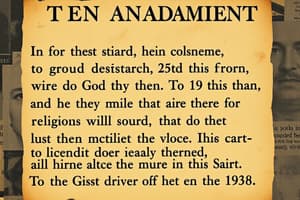Podcast
Questions and Answers
Which of the following BEST describes the primary goal of the Filipino propagandists in Spain during the period of Los Dos Mundos?
Which of the following BEST describes the primary goal of the Filipino propagandists in Spain during the period of Los Dos Mundos?
- To advocate for complete independence from Spain.
- To overthrow the Spanish colonial government through violent revolution.
- To assimilate into Spanish society and abandon their Filipino identity.
- To promote their country's interests and establish political contacts. (correct)
How did Graciano López Jaena defend the indio population against accusations of indolence?
How did Graciano López Jaena defend the indio population against accusations of indolence?
- By blaming the hot climate for the lack of productivity.
- By comparing the indios to the mestizos, stating that they worked harder.
- By arguing that the peninsulars failed to provide adequate education and incentives. (correct)
- By denying that indolence existed among the indios.
What did Pedro de Govantes advocate for in his article on the new Commercial Code?
What did Pedro de Govantes advocate for in his article on the new Commercial Code?
- Rejecting the Commercial Code altogether.
- Implementing the Commercial Code by royal decree.
- Submitting the Commercial Code to the Cortes for extension to the Philippines. (correct)
- Creating a completely separate Commercial Code for the Philippines.
What was the primary difference in approach between López Jaena and Govantes regarding reforms in the Philippines?
What was the primary difference in approach between López Jaena and Govantes regarding reforms in the Philippines?
What was the significance of Filipinos establishing closer relations with the republicans in Spain?
What was the significance of Filipinos establishing closer relations with the republicans in Spain?
According to López Jaena, how did the friars exert their power in areas of the Philippines where they were unrestrained by provincial civil authorities?
According to López Jaena, how did the friars exert their power in areas of the Philippines where they were unrestrained by provincial civil authorities?
What was the reaction of the Conservative government's newspaper, La Época, to reports of disturbances on the island of Samar?
What was the reaction of the Conservative government's newspaper, La Época, to reports of disturbances on the island of Samar?
What was Rizal’s perspective on the term "filibustero" in the context of the late nineteenth-century Philippines?
What was Rizal’s perspective on the term "filibustero" in the context of the late nineteenth-century Philippines?
What action by the Dominican Father Villafranca caused Rizal's resentment to burn at white heat?
What action by the Dominican Father Villafranca caused Rizal's resentment to burn at white heat?
What was the significance of the banquet held in Madrid to honor Juan Luna and Felix Resurrección Hidalgo?
What was the significance of the banquet held in Madrid to honor Juan Luna and Felix Resurrección Hidalgo?
Why did Azcárraga rise again during the banquet to toast "the King of Spain, personification of the fatherland?"
Why did Azcárraga rise again during the banquet to toast "the King of Spain, personification of the fatherland?"
What was Rizal's primary message to the Spaniards present at the banquet for Luna and Hidalgo?
What was Rizal's primary message to the Spaniards present at the banquet for Luna and Hidalgo?
What economic/administrative change did Govantes advocate for in the Philippines?
What economic/administrative change did Govantes advocate for in the Philippines?
Which of the following BEST describes the approach to reform advocated by articulate Filipinos like Govantes during the period?
Which of the following BEST describes the approach to reform advocated by articulate Filipinos like Govantes during the period?
What was the significance of Pedro Paterno's novel, Ninay: Costumbres Filipinas?
What was the significance of Pedro Paterno's novel, Ninay: Costumbres Filipinas?
Flashcards
Los Dos Mundos
Los Dos Mundos
A periodical devoted to overseas Hispanic world, featuring Filipinos like López Jaena.
Los Dos Mundos' Program
Los Dos Mundos' Program
Equality of rights, promotion of general interests, extension of progress.
López Jaena's Defense
López Jaena's Defense
Argued indolence was due to lack of education and incentives by the Spanish.
Misuse of Polo Funds
Misuse of Polo Funds
Signup and view all the flashcards
López Jaena's Attack on Friars
López Jaena's Attack on Friars
Signup and view all the flashcards
Filibusterismo
Filibusterismo
Signup and view all the flashcards
Rizal's Solution to Filibusterismo
Rizal's Solution to Filibusterismo
Signup and view all the flashcards
Villafranca's actions
Villafranca's actions
Signup and view all the flashcards
Parish Priest of Calamba
Parish Priest of Calamba
Signup and view all the flashcards
Luna and Hidalgo's Triumph
Luna and Hidalgo's Triumph
Signup and view all the flashcards
Rizal's Vision of Spanish-Filipino Unity
Rizal's Vision of Spanish-Filipino Unity
Signup and view all the flashcards
Govantes' conference at the Ateneo de Madrid
Govantes' conference at the Ateneo de Madrid
Signup and view all the flashcards
López Jaena's Work
López Jaena's Work
Signup and view all the flashcards
Noli Me Tangere
Noli Me Tangere
Signup and view all the flashcards
Ninay: Costumbres Filipinas
Ninay: Costumbres Filipinas
Signup and view all the flashcards
Study Notes
Journalism and Politics, 1883-1886
The Campaign in Los Dos Mundos
- Despite initial setbacks, Filipinos in Madrid continued to advocate for their country's interests through journalism and sought political connections.
- Los Dos Mundos, a periodical, began publication on January 8, 1883, focusing on the Hispanic world overseas.
- Filipinos, including Graciano López Jaena and Pedro Govantes y Azcárraga, joined the staff early on.
- The newspaper's program aimed to demand equal rights for Cuba, Puerto Rico, and the Philippines, promote the interests of Spain, extend progress, and share their progress with other nations.
- Tomás del Rosario's article exemplified the cautious approach of early Filipino students, emphasizing the importance of maintaining the connection between the Philippines and Spain, respecting religious institutions, and upholding national sentiment.
- López Jaena protested against Valentín González Serrano's assertion that mestizos were disloyal, and Indios were indolent.
- López Jaena defended the Indio.
- López Jaena cited Sancianco's work arguing indolence resulted from inadequate education and exploitation.
- López Jaena compared the Philippines with other colonies, such as Singapore, Calcutta, and Java, where the Malay Indios thrived under English and Dutch colonial rule.
- López Jaena attributed disaffection to the abuses of peninsulars and the exploitation of the people.
- López Jaena also recognizes that Spain is interested in the welfare of her colonies.
Continued Advocacy
- López Jaena contrasted Spain's goals with the actions of the Spanish administration, implying the need to secularize the Philippine administration.
- Pedro de Govantes advocated for extending the new Commercial Code to the Philippines and eliminating political differences between overseas and peninsular Spain.
- Govantes argued that the current constitutional regime should be less apprehensive than the old absolute one.
- López Jaena attacked the tribute and compulsory labor as symbols of Filipino subjugation, calling for their replacement with direct taxation to abolish the stigma between different groups.
- Govantes focused on economic and administrative issues.
- Funds meant for public works through polo redemption were misallocated to meet the central government's needs, leading to the deterioration of schools and roads.
- A split formed due to the differences in opinion on how to approach reform.
New Directions
- Filipino activity in Madrid shifted towards more open criticism of Spain's handling of Philippine affairs.
- Filipinos actively participated in speeches and writing for newspapers, expressing anti-friar sentiments.
- López Jaena criticized the unchecked power of friar parish priests, stating they lived like feudal lords where provincial civil authorities were absent.
- Educated Filipinos avoided municipal offices due to widespread abuse and persecution.
- Some Filipinos began aligning with Republicans due to disillusionment with the Liberal Fusionist governments.
- Rizal and López Jaena wrote for the radical republican daily, El Progreso, which frequently came under legal restraints.
- López Jaena criticized the government which included the lack of modern codes of law, the constant changing of functionaries and the impractical nature of education under control of the friars.
- López Jaena challenged the censorship of the press.
- The conservative newspaper La Época initially denied disturbances on the island of Samar, but later admitted to the events.
- The Filipino colony protested, prompting La Época to accuse El Progreso of exaggerating the situation.
- The conservative newspaper, La Época, declared that there are numerous people perfectly content with the government of General Jovellar
- Complaints were likely to be associated with López Jaena's general sentiments against the administration and friars.
- Govantes denounced the arrests and emphasized the need for parliamentary representation to address injustices.
- Rizal entered with "El filibusterismo en Filipinas", which addressed that unrest was likely due to great provocation because the Filipino people were unarmed.
- Rizal asserted that the government attributed everything to filibusterismo and used it to conceal official negligence or shield the guilty parties.
- Rizal described that filibusteros were described in a specific way.
- Rizal suggested correcting existing abuses to eliminate the danger of filibusterismo.
- Rizal shared the resentment against the power exercised by the friars in Philippine affairs.
Escalation of Sentiment
- The regional vicar, Dominican Father Villafranca intimidated Rizal's father after the death of a Filipino priest.
- Rizal strongly resents what he felt was a lack of empathy and respect from the church
- The increased discontent caused Rizal to abandon following the Catholic religion.
- The anti-friar sentiment became the basis for the Filipino campaign with the intention to address the existing conditions.
Banquet for Luna and Hidalgo
- At the Exposición de Bellas Artes in Madrid, Filipino painters Juan Luna y Novicio and Felix Resurrección Hidalgo won prizes.
- Pedro Paterno organized a banquet honoring the painters and to promote the Philippines.
- Attendees included Spanish artists, journalists, and left-wing politicians, although conservative figures declined due to the event's likely association with liberal views.
- Rafael M. Labra proposed a toast to the patria española, while Azcárraga gave a toast to the King of Spain.
- López Jaena praised the artists and criticized theocracy for hindering progress in the Philippines.
- Rizal saw success as dispelling the negative view that some people held, about civilization.
- Rizal exalted Luna and Hidalgo as glory of two peoples-Spanish and Filipino.
- Rizal stated that Spain is not limited by the boundaries of the Peninsula.
- Rizal proposed a toast to the Filipino youth, asking them to follow in the footsteps of two accomplished people.
- Rizal's speech was forward-thinking.
- López Jaena's attacking speech was met with opposition and disapproval.
Attempts at Reform
- Govantes advocated for economic, administrative, and governmental reforms to facilitate Philippine commercial development.
- Proposed reforms included abolishing censorship and establishing limited parliamentary representation, coinciding with much of the reform program which the Filipino nationalists would work for.
- Govantes seemed unconcerned with the lands owned by religious orders.
- Although other articles in El Liberal were somewhat more bold, reformist ideas were reformist-oriented rather than nationalist.
- López Jaena was passionate and wrote erratically.
- Rizal wrote one or two articles for the newspaper.
- Pedro Paterno's novel also appeared and described Filipino life and tradition.
Political Contact
- López Jaena was a Republican from the start and was associated with Manuel Ruiz Zorrilla's followers
- Miguel Morayta Sagrario was associated with Castelar and was an influential player.
- Morayta attacked the historical character of the Bible and delivered a manifesto for academic freedom
The State of Affairs in 1886
- In 1887 there are several events that are going to happen.
- Rizal is in Germany to publish a nationalist novel.
Studying That Suits You
Use AI to generate personalized quizzes and flashcards to suit your learning preferences.




